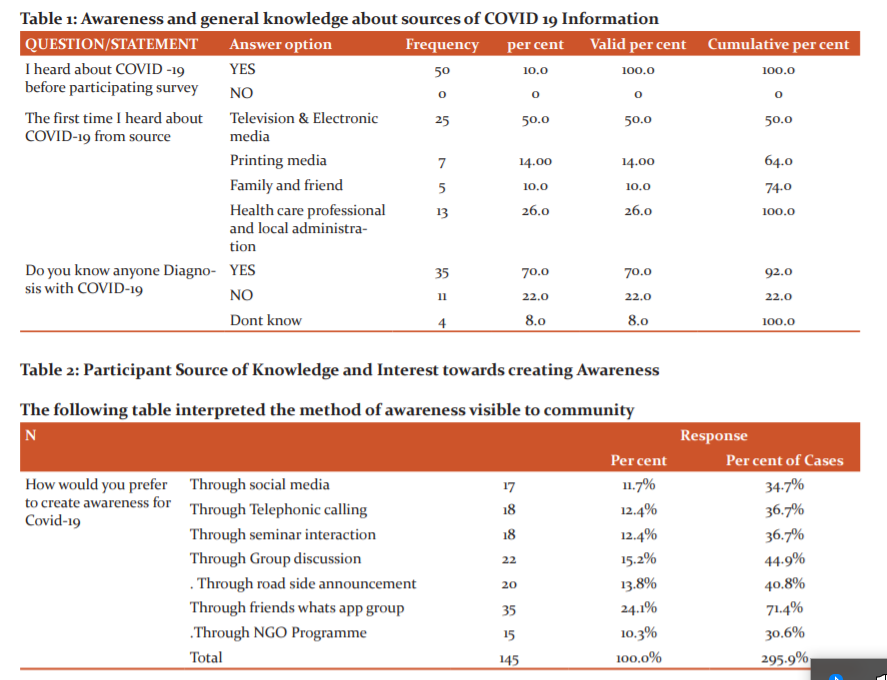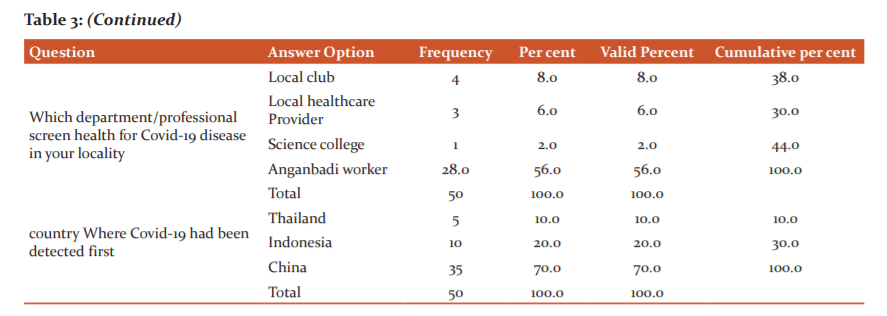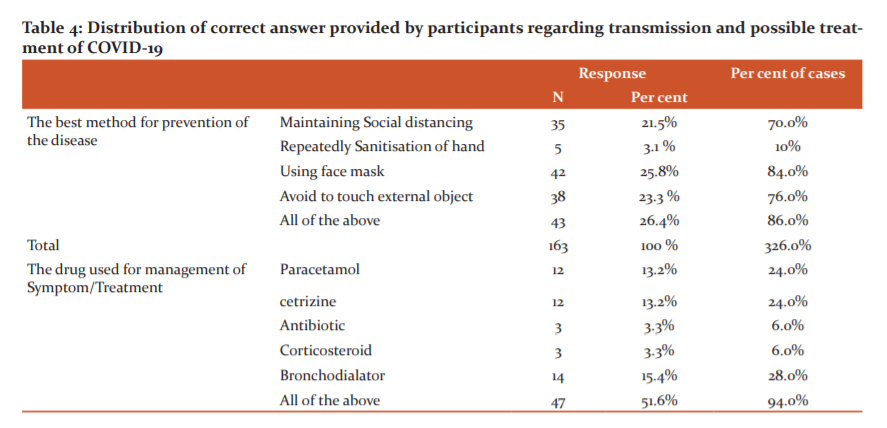IJCRR - 13(5), March, 2021
Pages: 26-31
Date of Publication: 03-Mar-2021
Print Article
Download XML Download PDF
Evaluation of Covid-19 Awareness and Understanding Amongst Pharmacy Students at Gayatri College of Pharmacy Sambalpur, Odisha
Author: Ray B, Biswal PK, Panda BB, Dash SN
Category: Healthcare
Abstract:Introduction: Global Pandemic COVID-19 caused by Severe acute respiratory syndrome Coronavirus 2(SARS COV 2) spreading rapidly and become a serious challenge for the entire healthcare profession. It results in a significant burden on the human race. There is no effective treatment so far discovered for the SARS CO V 2. As the modified strain of the virus is new the research on various aspect like pathogenesis, prognosis, etc are limited due to lack of time and rapidly spreading. The best measure is prevention by maintaining social distancing and other hygienic measures. Objective: The surveyor study Aims to determine the level of awareness, perception and professional knowledge of COVID 19, Global pandemic in different aspects like mode of transmission, Preventive and Precaution and approved treatment protocol among Pharmacy students at various stages in the study. one of the vital aims is to identify the key source of gained awareness as well as identify which of these were is the most effective in information delivery. Methods: A cross-sectional study was conducted among Pharmacy students of Gayatri Colege of Pharmacy, Sambalpur using a questionnaire total of 50 Participants who fully completed the questionnaire were included in the Study. Results: Participants were surveyed on their knowledge including the source of Information, Possible source of creating awareness. Conclusion: The result suggests that Participants basic knowledge about COVID-19 is acceptable. Although improvements are advised in the understanding of preventive measures that can be taken, Recommended more focus towards it as it is so helpful in creating Awareness.
Keywords: Pandemic, COVID-19, Pathogenesis, Awareness, Social Distancing, Sanitisation, Vaccine
Full Text:
Introduction
The World Health Organization (WHO) “defines coronavirus as a large family of viruses that cause illness ranging from the common cold to more severe disease”. The name comes from the Latin word “corona”, which means “crown” or “halo”, and refers to the shape of the virus particle when viewed under a microscope. “Coronaviruses are zoonotic, meaning they are transmitted between animals and people”, the WHO says. Coronavirus is an infectious disease caused by a type of common virus that infects humans, typically leading to an upper respiratory infection (URI). Seven different types of human coronavirus have been identified. Most people will be infected with at least one virus in their lifetime.1,2
Corona virus disease 2019(COVOD-19) caused by this newly discovered virus has very quickly spread all over the world. Considering the rapidly increasing number of cases the WHO declared a pandemic on 11th March 2020. The incubation period of this disease transmitted by droplets ranges from 2 to 14 days, usually between 3 and 7.3,4 On Jan. 7, 2020, The virus has been isolated in china by the Chinese authority of Health. The virus pathogenesis was quite a new model. To understand the Pathology of Infection at that time was quite crucial.
SARS-CoV-2 is a single-stranded, positive-sense RNA coronavirus which causes an illness called COVID-19 (note that many people still equate and interchange the disease name COVID-19 with the new official virus named SARS-CoV-2). It is a new strain of coronavirus which is causing an Illness of Respiratory tract. Sometimes it is mild, sometimes moderate, sometimes serious. People who have other underline problem or comorbidity factor, they are high risk.
Pathogenesis
The severe symptoms of COVID-19 are associated with an increasing number and rate of fatalities especially in the epidemic region of China. On January 22, 2020, the China National HealthCommissionreportedthe details of the first 17 deaths and on January 25, 2020, the death cases increased to 56 deaths. The percentage of death among the reported 2684 cases of COVID-19 was approximately 2.84% as of Jan25, 2020 and the median age of the deaths was 75(range 48–89) years. Patients infected with COVID-19 showed higher leukocyte numbers, abnormal respiratory findings, and increased levels of plasma pro-inflammatory cytokines. One of the COVID-19 case reports showed patient at 5 days of fever presented with a cough, coarse breathing sounds of both lungs, and a body temperature of 39.0 °C. The patient's sputum showed positive real-time polymerase chain reaction results that confirmed COVID-19 infection. The laboratory studies showed leucopenia with leukocyte counts of 2.91 × 10^9 cells/L of which70.0% were neutrophils. Additionally, a value of 16.16 mg/L of blood C-reactive protein was noted which is above the normal range(0–10 mg/L). High erythrocyte sedimentation rate and D-dimer were also observed. The main pathogenesis of COVID-19 infection as a respiratory system targeting virus was severe pneumonia, anaemia, combined with the incidence of ground-glass opacities, and acute cardiac injury. Significantly high blood levels of cytokines and the-machines were noted in patients with COVID-19 infection that includedIL1-β, IL1RA, IL7, IL8, IL9, IL10, basic FGF2, GCSF, GMCSF, IFNγ, IP10, MCP1, MIP1α, MIP1β, PDGFB, TNFα, and VEGFA. Some of the severe cases were admitted to tertiary care hospital or hospital specially design for Corona Patient.5 The infection is manifested by the following abnormality in laboratory test result: Leucopenia, lymphocytopenia, Increase level of LDL and CRP. The imaging technique is an important tool for the diagnosis. Chest computed tomography is presently recommended by an expert as a screening examination.6,7
Mode of Transmission
As it is a kind of Respiratory Infection, the main mode is Droplet Infection. Droplet of respiratory material when move in air, nearby person gets infected. Surface contact is another main mode of infection as the virus sustained for the long term in any surface. Transmission can be occurred by respiratory droplet or surface contact of the infected spot as the virus exists for a long time in the surface inactive form. person to person infection occurs which is known as community spread.8
Sign and Symptom
Signs and symptoms of COVID-19 infection include flu-like symptoms that worsen to
-
-
fever,
-
coughing, and
-
shortness of breath.
-
Headache and body ache
-
sometimes Diarrohea.
Sometimes flu-like symptom starts and sometimes runny nose which may resemble another flu symptom. Difficulty in breathing is the outcome of Untreated Infection. Early diagnosis is essential. It is early in the outbreak of this new disease, so the current approximation of the mortality rate may go up or down.9
Treatment and Prevention
Globally many drug and therapies are being considered or used for treatment. Usually, the drug treatment is approved by concern healthcare administration of that region. But sometimes Doctor is using a treatment that has not been approved for COVID-19. They are treating the patient using drug beyond their indication, approved use and with few scientific evidence. Sometimes they are advancing drug by extrapolation from in-vitro studies indicating their antiviral and anti-inflammatory study.10 China where the pandemic was originated, Hospitals are using traditional Chinese medicine which has been reported to be good effect.11,12
As severe acute respiratory syndrome SARS CO V-2, the causative agent of COVID-19 has a close genetic resemblance with the SARS-CO V and the middle east respiratory syndrome. (MERS) CO V, drugs used to treat SARS and MERS are utilised to explore the extent of their activity against SARS CO V 2.Due to the rapid spread of the disease and its high rate of contagion as well as the cost and time for development and marketing of a new, safe and efficacious drug, professional and researcher are looking to repurpose new drug to treat COVID-19.13
The virus is new. So the research on various aspects like pathogenesis, treatment, the prognosis is limited to due lack of time versus rapid spread of virus globally. There is no specific therapy approved by the US Food and Drug Administration (FDA). For the present virus, only symptomatic treatment and treatment by antibiotics and antiviral drug trial basis following previous knowledge and individual complication. It will take time for the discovery of the vaccine and an appropriate drug for target-specific treatment. But the protocol of treatment given currently is highly successful in maximum cases. So the recovery rate is also quite satisfactory. The most important method to control the disease is to take preventive measure like social distancing, washing of hands frequently and using a face mask at public places, etc. Government of different countries are making strict rules for their citizens by implementing lockdown followed by shut down which doesn’t affect much because now the people should learn the art of living along with the virus. The main objective is to make social distancing between individuals which is the ray of hope in present scenarios.14
MATERIALS AND METHODS
A lot of Studies has attempted to explore knowledge and attitudes of healthcare professionals of various disciplines like Nursing, pharmacy and Medicine professional Students. The Subject area are TB,AIDS,Diabetes,Hypertension etc.But in the present area COVID-19, This type of survey is few in number or very rare in Pharmacy decline.
A study carried out by Akin, et al (2011) investigated the level of knowledge and attitude towards understanding and creating awareness of Turkish Nursing Students about the disease TB, intending to determine whether making changes to their teaching and this type of survey would improve their attitude, as a result of the reflection of awareness in Society.15 Singal, N(1999) Also perform a Survey in the field of Communicable disease TB among Nurses working in a Tuberculosis Hospital.16 This type of Survey Design is quite helpful for students and Healthcare worker to understand the Disease-related information in an interesting way. Later on, the knowledge will be propagated and transmitted in society for creating a high magnitude of Awareness through professionals. The present survey has been designed by following the framework/model of the above study.
Study Question
The present study sought to explore the degree of COVID-19 Awareness among Pharmacy Student at GCP and identify the key point of gained awareness.
This was a questionnaire-based cross-sectional study. The participant's information and were questionnaire distributed in Web Base class to Pharmacy student at GCP by the researcher. The questionnaire was made up of twenty multiple type question divided into three separate categories. Section A contains Demographic information meant to understand the difference in Awareness and level of knowledge between different population group. Section B contains five-question relating to COVID 19 Awareness and Possible source of existing knowledge. The rest of the question was mentioned in Section C which included detail question on cause, transmission, symptom and medication etc, aims to test Participants basic understanding of COVID-19. The final question in this section explored participants attitude to creat Awareness as a student of the Healthcare profession. All participants were provided with information as the short discussion about COVOD -19 to support their learning after they send their response.
Sampling methods
Participants were exclusively Pharmacy Students at different stages of study at the GCP with the understanding that their comp questionnaire lesion of the questionnaire will imply their consent to participate in this study. Few incomplete questionnaires were later on omitted from data set which resulted in yielding a total of 50 complete response.
Data Analysis
Statistical analysis has been carried out by using SPSS Software and excel programme. Before running analysis responses were screened for the incomplete response(i.e Partially answered or completely unanswered questionnaire .) which were subsequently removed from data set. The questionnaire with more than three unanswered questions is considered as incomplete. The analysis consisted using frequency distribution for the total participant sample and each demographic characteristics. Dichotomous formatting enabled detail analysis of responses within each participant.
Results
Demographic characteristic of Respondents
The analysis involved 14 pharmacy students (64% female and 36 % male) from two selective semesters in Study. The age range of participant was 18-24. Sources of gained awareness and education were also explored to identify which method was most effective in their opinion.
Covid Awareness and Source of Existing Knowledge
All respondent indicated that they have Previously heard about COVID-19. Among participant twenty-five per cent, student indicate that
Participants basic understanding of COVID-19
Majority of participants identify and indicate the appropriate method of creating awareness. Maximum Participant identified COVID-19 is a Viral Disease. Most Participants agreed that COVID-19 is a viral disease. Most participants indicated that Anganwadi (the local group for primary health screening programme under Govt of Odisha and India), Participate in Primary screening of health for COVID-19. Most of the participant agreed that Maintaining Social Distancing, Repeatedly sanitisation of hand, Using face mask, Avoiding to touch any external object is a series or package for prevention of COVID-19 in community. [Ethical clearance-Ethical requirement for the survey was granted by principal Gayatri college of pharmacy who is also one of the co-authors for the Manuscript. No-GCP/000
Participant COVID awareness and self-identified source of knowledge
Following data (Table 1) indicates the awareness and general knowledge about sources of COVID 19 Information



Understanding Transmission and Possible Treatment of COVID-19
Table 4 indicated the Distribution of correct answer provided by participants regarding transmission and possible treatment of COVID-19.

Discussion
Participants were surveyed on their knowledge including the source of Information, Possible source of creating awareness. Participants have also surveyed on their knowledge the causative organism and basic idea about COVID-19 which include the mode of spread, treatment management and possible method of Prevention to spread within the community.
The finding has highlighted the need to increase awareness and a boosting tool for enhancement of current education, knowledge and awareness about COVID-19, Among Pharmacy students, who are highly professional as a community pharmacist in Creating Social awareness in Community. Most participants were third and Fifth-semester students. Male participants were considerable ow when compared to female participants.
Conclusion
Participants basic knowledge about COVID-19 is acceptable. Although improvements are advised in the understanding of preventive measures that can be taken, Recommended more focus towards it as it is so helpful in creating Awareness.
Acknowledgement:
The authors are highly thankful to the Student Society of GCP. The authors also highly acknowledge the help of the Staff member of Dept of Pharmacology GCP for encouraging the students to participate in the Survey.
Conflict of Interest and Source of Funding
There is NO Conflict of interest with the article.
There is NO EXTERNAL FUNDING SOURCE.
CONTRIBUTION OFF AUTHORs :
1. Dr. B. Ray: Designing of Manuscript and Analysis of Data
2. Dr. P.K. Biswal: Collection of Data
3. Dr. B.B. Panda: Tabulation of data
4. Prof. S.N. Das: Deals with the ethical matter.
References:
[1] World Health Organization. Clinical management of severe acute respiratory infection when novel coronavirus (nCoV) infection is suspected https://www.who.int/publicationsdetail/clinical-management-of-severe-acute-respiratory-infection-when-novel-coronavirus(ncov)-infection-is-suspected.
[2] CDC Website: https://www.cdc.gov/coronavirus/2019-ncov/hcp/clinical-guidancemanagement-patients.html.
[3] Zhou P, Yang XL, Wang XG, Hu B, Zhang L, Zhang W, et al. A pneumonia outbreak
associated with a new coronavirus of probable bat origin. Nature 2020;579:270-273.
[4] Lai CC, Shih TP, Ko WC, Tang HJ, Hsueh PR. Severe acute respiratory syndrome
coronavirus 2 (SARS-CoV-2) and coronavirus disease-2019 (COVID-19): the epidemic
and the challenges. Int J Antimicrob Agents 2020;55(3):105924.
[5] Chu CM, Cheng VCC, Hung IFN, Role of lopinavir/ritonavir in the treatment of SARS: initial virological and clinical findings. Thorax 2004;59(3):252-256.
[6] Jin YH, Cai L, Cheng ZS, Cheng H, Deng T, Fan YP, et al. A rapid advice guideline for
the diagnosis and treatment of 2019 novel coronavirus (2019-nCoV) infected
pneumonia (standard version). Mil Med Res 2020 Feb 6;7(1):4.
[7] Bernheim A, Mei X, Huang M, Yang Y, Fayad ZA, Zhang N, et al. Chest CT findings
in coronavirus disease-19 (COVID-19): relationship to duration of infection.
Radiology 2020;295(3):200463.
[8] Guan WJ, Ni ZY, Hu Y, Liang WH, Ou CQ, He XJ, et al. Clinical characteristics of
coronavirus disease in 2019 in China. N Engl J Med 2020; 382(18):1708-1720.
[9] Jin Y, Cai L, Cheng Z. A rapid advice guideline for the diagnosis and treatment of 2019 novel coronavirus (2019-nCoV) infected pneumonia (standard version). Military Med Res 2020;7:4.
[10] Kalil AC. Treating COVID-19-Off-label drug use, compassionate use, and randomized clinical trials during pandemics. JAMA 2020;323:1897-1898.
[11] Ji S, Bai Q, Wu X, Zhang DW, Wang S, Shen JL, et al. Unique synergistic antiviral effects of shifting jiedu capsule and oseltamivir in influenza A viral-induced acute exacerbation of the chronic obstructive pulmonary disease. Biomed Pharmacother 2020;121:109652.
[12] Yao KT, Liu MY, Li X, Huang JH, Cai HB. Retrospective clinical analysis on treatment of novel coronavirus-infected pneumonia with traditional Chinese medicine Lianhua-Qingwen. Chin J Exp Tradit Med Form 2020;12:1-7.
[13] Folegatti PM, Ewer KJ, Aley PK, Angus B, Becker S, Belij-Rammerstorfer S, et al. Safety and immunogenicity of the ChAdOx1 nCoV-19 vaccine against SARS-CoV-2: A preliminary report of a phase 1/2, single-blind, randomised controlled trial. Lancet 2020;396:467-478.
[14] Ray B, Motalebi M, Nanda SS. Global Pandemic COVID 19: The art of living with the virus. J Hospital Pharm 2020;15(3):67-74.
[15] Gorak AS, Unsure G, Molaglu S, Godzilla M, Durna ZK. Knowledge of and attitudes towards tuberculosis of Turkish Nursing and Midwife students. Nurse Education Today 2011;31(8):774-779.
[16] Singal N, Sharms P, Jain R. Awareness about tuberculosis among Nurses working in a tuberculosis hospital and a General Hospital in Delhi, India. Int J Tuberc Lung Dis 1999;2(12):1005-1010.
|






 This work is licensed under a Creative Commons Attribution-NonCommercial 4.0 International License
This work is licensed under a Creative Commons Attribution-NonCommercial 4.0 International License